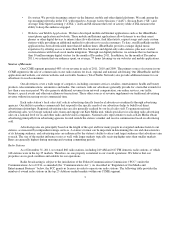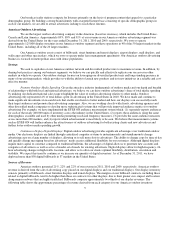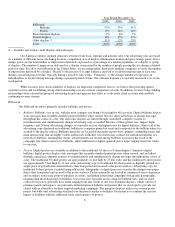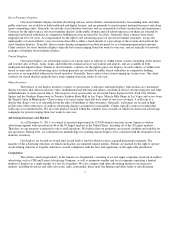iHeartMedia 2011 Annual Report Download - page 16
Download and view the complete annual report
Please find page 16 of the 2011 iHeartMedia annual report below. You can navigate through the pages in the report by either clicking on the pages listed below, or by using the keyword search tool below to find specific information within the annual report.
FCC concerning complaints that programming aired on our stations contains indecent or profane language. FCC action on these
complaints will be directly impacted by the outcome of the indecency court proceedings and subsequent FCC action in response
thereto.
E
qual Employment Opportunity
The FCC’s rules require broadcasters to engage in broad equal opportunity employment recruitment efforts, retain data
concerning such efforts and report much of this data to the FCC and to the public via stations’ public files and websites. Broadcasters
could be sanctioned for noncompliance.
Technical Rules
Numerous FCC rules govern the technical operating parameters of radio stations, including permissible operating
frequency, power and antenna height and interference protections between stations. Changes to these rules could negatively affect the
operation of our stations. For example, in January 2011 a law that eliminates certain minimum distance separation requirements
between full-power and low-power FM radio stations was enacted, which could lead to increased interference between our stations
and low-power FM stations. In March 2011 the FCC adopted policies which, in certain circumstances, could make it more difficult
for radio stations to relocate to increase their population coverage.
Content, Licenses and Royalties
We must pay royalties to copyright owners of musical compositions (typically, songwriters and publishers) whenever we
broadcast or stream musical compositions. Copyright owners of musical compositions most often rely on intermediaries known as
performance rights organizations to negotiate so-called “blanket” licenses with copyright users, collect royalties under such licenses
and distribute them to copyright owners. We have obtained public performance licenses from, and pay license fees to, the three major
performance rights organizations in the United States known as the American Society of Composers, Authors and Publishers, or
ASCAP, Broadcast Music, Inc., or BMI, and SESAC, Inc., or SESAC.
To secure the rights to stream music content over the Internet, we also must obtain performance rights licenses and pay
performance rights royalties to copyright owners of sound recordings (typically, performing artists and recording companies). Under
Federal statutory licenses, we are permitted to stream any lawfully released sound recordings and to make reproductions of these
recordings on our computer servers without having to separately negotiate and obtain direct licenses with each individual copyright
owner as long as we operate in compliance with the rules of statutory licenses and pay the applicable royalty rates to SoundExchange,
the non-profit organization designated by the Copyright Royalty Board to collect and distribute royalties under these statutory
licenses. In addition, we have business arrangements directly with some copyright owners to receive deliveries of their sound
recordings for use in our Internet operations.
The rates at which we pay royalties to copyright owners are privately negotiated or set pursuant to a regulatory process. There is
no guarantee that the licenses and associated royalty rates that currently are available to us will be available to us in the future.
Increased royalty rates could significantly increase our expenses, which could adversely affect our business.
P
rivacy
As a company conducting business on the Internet, we are subject to a number of laws and regulations relating to information
security, data protection and privacy, among other things. Many of these laws and regulations are still evolving and could be
interpreted in ways that could harm our business. In the area of information security and data protection, the laws in several states
require companies to implement specific information security controls to protect certain types of personally identifiable information.
Likewise, all but a few states have laws in place requiring companies to notify users if there is a security breach that compromises
certain categories of their personally identifiable information. Any failure on our part to comply with these laws may subject us to
significant liabilities. Further, any failure by us to adequately protect the privacy or security of our listeners’ information could result
in a loss of confidence in us among existing and potential listeners, and ultimately, in a loss of listeners and advertising customers,
which could adversely affect our business.
We collect and use certain types of information from our listeners in accordance with the privacy policies posted on our
websites. We collect personally identifiable information directly from listeners when they register to use our services, fill out their
listener profiles, post comments, use our social networking features, participate in polls and contests and sign up to receive email
newsletters. We also may obtain information about our listeners from other listeners and third parties. Our policy is to use the
collected information to customize and personalize advertising and
13
























